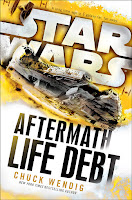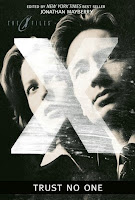You remember the Procrasti from Deep Space Nine, right? They were that race from the Gamma Quadrant that was going to come through the wormhole someday…
Geek joke.
I saw a thing floating around Twitter a month or three back, one of those clickbaity “this article EXPLODES one of the biggest myths about writing…” And that myth was that writers need to write every day. Which, granted, the vast majority of professional writers—myself included—will all tell you to do if you want to do this for a living. But according to this little piece, that’s complete nonsense. If I only write once a week, good for me. If I need to wait for inspiration, that’s fine. What’s important is that I’m writing at a rate that’s comfortable for me.
Now, in all fairness to the article, I’ve said similar things here. If you can only write on Sundays, standing on your head while wearing that “enhancing” corset you bought at the ren faire last year, but you always write 15,000 words in a session… well, congratulations. It’s a damned weird system, but it works for you. So what if you don’t write the other six days of the week. Fifteen thousand words a week is fantastic. I know some pros who don’t hit those numbers consistently. Hell, I usually don’t hit those numbers.
However…
If I’m only cinching myself into the corset once every two or three weeks, and only writing a hundred words when I do… there’s a chance I just may not be taking this whole writing thing that seriously.
And there’s nothing wrong with that in a larger sense. If I just want to scribble blog posts or fan fic as the mood strikes me, that’s fine. I know a few people who write as more of a therapy thing, some who do it for fun, and one who did it as a sort of… well, she’d been single for a while. Let’s leave it at that.
Again, no big deal if that’s how I approach it. To fall back on an analogy I’ve used once or thrice, not everybody who cooks needs to be a chef. Or wants to be. I love cooking, playing around with spices, trying new things with pizzas or pasta… but I’m never going to be a chef. I’m fine with that. I’m just doing this to have some fun on the weekends.
But… if I wanted to be a chef, to actually get paid for cooking, I’m probably going to have to put some work into it. And that means doing it more often than when the mood strikes me. It means sometimes I’d need to stay home and cook rather than going out with friends.
And, yeah, sometimes that work can mean other things. It can mean reading cookbooks. Or watching cooking videos on YouTube. Maybe even eating out sometimes.
But in the end… it means I’m going to be cooking. A lot. There’s really no other way to do it.
Same with writing. If I want to make money off this storytelling thing—if I want to do it for a living—I’m going to have to write. A lot. On a fairly regular, consistent basis.
I wrote my first three novels and a good-sized novella while I was working full time as an entertainment journalist. And reading scripts on the side. So I was often doing four or five thousand words a week to put food on the table and pay rent, then staying in the chair to do another six or seven thousand on the stuff that I wanted to be paying rent with.
Hell, I know two full-time, professional writers (about to be three) who had babies this year. Little, squishy new-humans who pretty much need constant attention (granted, I’ve never had one myself, so that’s just conjecture on my part). And those three are all still writing.
 It’s fine to tell myself that I’m waiting for the muse. Or that I’m reading a how-to book about crafting the perfect first sentence. Or that playing Dawn of War III is going to be a vital part of my creative process. We all have our own methods when it comes to writing. Like that corset.
It’s fine to tell myself that I’m waiting for the muse. Or that I’m reading a how-to book about crafting the perfect first sentence. Or that playing Dawn of War III is going to be a vital part of my creative process. We all have our own methods when it comes to writing. Like that corset.
But there is also a point that… well, I’m just not writing.
Again, depending on what I want out of this, that may be fine. If I only post on my blog once a month… so what? If I just write slash-fic when I’m bored, hey, it passes the time. If this is just a hobby that I do every couple of weeks… awesome.
If I keep telling you how much I want to be a chef, though… wouldn’t it be weird if I only cooked one or two meals a week? Or two or three times a month?
I mean, that just doesn’t make much sense, right?
Next time, I want to talk about something crazy.
Until then, go write.
Oh! And if you’re in the Los Angeles area, this Sunday is the Writers Coffeehouse at Dark Delicacies in Burbank. Noon to three, open to writers of all levels. It’s completely free—no sign up or anything, just stop by and pull up a chair.
Okay… now go write.









